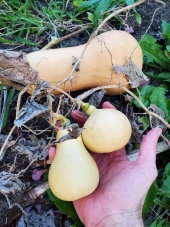L. Johnson wrote:Did you look at the roots? Sometimes the soil conditions in one spot just aren't appropriate. Maybe there was a rock blocking root growth. Maybe that spot of soil was nutrient deficient. Maybe those seeds were as you suggest, not good in the genes.
Were they shaded out? Was water equally available?
There are tons of possibilities. Herbicide and other contaminants included.
I did not look at the roots, I just cut everything at soil level, weeded the bed and planted hardneck garlic. I've gardened in the same spot since 2010. The first few years I tilled the soil but had the garden at ground level. Since 2017 it has been more of a raised bed with dug out pathways between the planting areas. So no rocks. I add cow manure and compost every spring, fork it in and plant my spring vegetables. So I wouldn't expect it to be nutrient deficit. I picked this spot for the garden when I moved in because it gets no shade, it is literally the sunniest spot on the property. The whole area receives water via a sprinkler.
William Bronson wrote:Welcome tp Permies!
I am not very knowledgeable about squash or watermelons, but hopefully someone who is will chime in.
How is the light along the property line?
Is there a fence casting shade?
There is a chain link fence and a grass lawn on the other side. It doesn't cast shade on the garden. I chose this spot to put my garden when I bought the property because it is the sunniest spot on my property.





